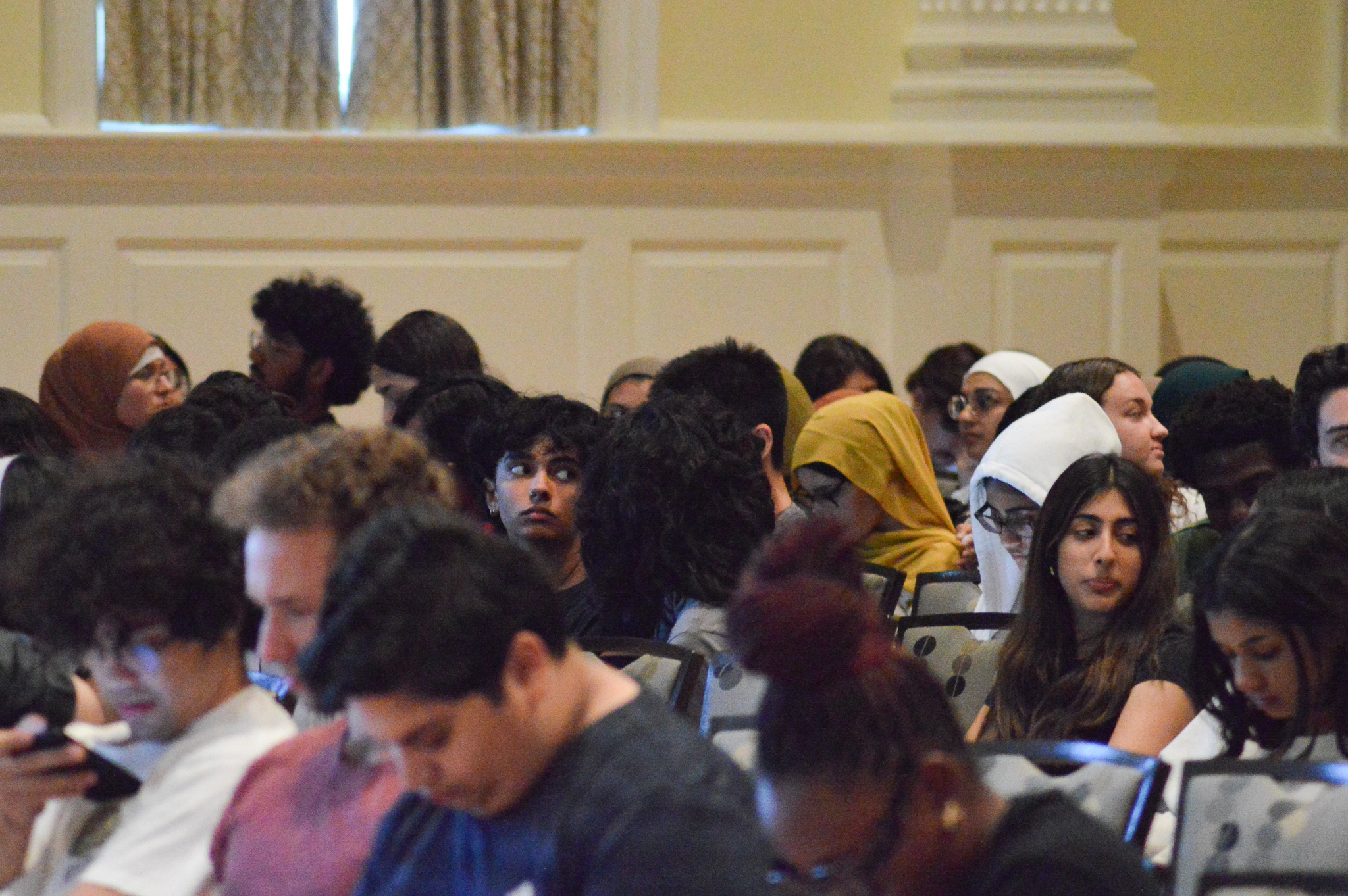By Sam Gauntt and Natalie Weger
More than 100 University of Maryland students attended SGA committee meetings on Monday and Tuesday to gain committee voting rights ahead of an anticipated divestment resolution.
The resolution, which could be introduced in a Student Government Association general body meeting as early as next week, will likely be similar to a resolution the general body failed to advance in April. Last spring’s resolution called on the University System of Maryland Foundation to divest from “companies engaged in human rights violations” in places including Palestine, Myanmar and Guatemala.
In April, SGA legislators upheld the student affairs committee’s unfavorable report on the previous resolution, The Diamondback reported. Similar divestment resolutions did not pass in 2017 and 2019.
After an SGA resolution is initially presented at a general body meeting, it is sent to a primary committee, which will vote favorably or unfavorably on the resolution. Undergraduate students must attend at least one meeting of an open committee before they can vote in that committee.
Students attended the student affairs, civic and governmental affairs, and diversity, equity and inclusion committee meetings this week, expecting the resolution’s referral to one of those committees.
A resolution receives a favorable or unfavorable report through a simple majority vote in its primary committee. The SGA general body then votes whether to approve the committee report. If the report is approved, the general body can vote on the resolution.
[UMD SGA fails to advance divestment resolution]
In a Tuesday statement to The Diamondback, this university wrote that “any Student Government Association debate of the proposed [divestment] resolution will be conducted and led by students, and the outcome will have no bearing on university policy or practice.”
The expected divestment resolution comes more than a year after Hamas killed at least 1,200 people and took about 250 people hostage in an Oct. 7, 2023, attack on Israel, according to the Associated Press. Israel declared war on Hamas the next day, and its military forces have since killed more than 42,000 Palestinians in Gaza, the Associated Press reported Tuesday.
Some students who attended this week’s committee meetings said the anticipated resolution would stand up against human rights violations, while others said it would divide the campus community.
Senior cell biology and genetics major Yasmine Megdiche said the resolution would “set a precedent” that students do not support their tuition money going toward “occupational control” over Palestine and other regions.
“The way in which we word and advocate for those countries is very important,” Megdiche said. “Showing out to be able to gain voting rights for the divestment bill is super important.”
Junior public policy major Leora Rothschild told The Diamondback on Tuesday that some students believed last spring’s divestment resolution “singled-out” Israel.
Rothschild, a member of Kedma, an Orthodox Jewish student group at this university, said the anticipated resolution will not lead to divestment, but conflict on campus instead.
Senior management major Ben Blaine told The Diamondback Monday the anticipated resolution is “an absolute disgrace” and would create a “divisive environment.”
In a statement to The Diamondback on Tuesday, this university’s Jewish Student Union wrote that it will work to “defeat this inflammatory and dangerous resolution.”
“This divestment bill would promote a double standard that demonizes Jewish and Israeli students while throwing away any opportunity for dialogue,” the statement read.
[Two major defense contractors gave UMD more than $46 million from 2010 to 2023]
April’s resolution urged the university system foundation — which oversees the University System of Maryland’s financial assets — and this university’s administration to divest from companies that do not align with principles in the United Nations Global Compact, such as universal human rights, labor, environment and anti-corruption principles.
The university system and the university system foundation did not respond to The Diamondback’s request for comment.
In a statement to The Diamondback Tuesday, this university’s Students for Justice in Palestine chapter wrote that it supports the “movement calling for an end to the military industrial complex which has perpetuated genocide in Palestine.”
Senior economics major Mubarak Adeshina said the university system foundation should not give money to defense contractors such as Lockheed Martin, which are “contributing to a genocide” in Palestine, he said Tuesday.
“I would hope the [university system foundation], as a whole, realizes that what they do does affect the world,” Adeshina said.
The university has a yearslong relationship with Lockheed Martin and Northrop Grumman, The Diamondback previously reported. The two defense contractors gave more than $46 million combined in donations and research funding to this university between 2010 to November 2023, The Diamondback found.
CORRECTION: A previous version of this story misstated that the University System of Maryland Foundation is a private company. The foundation is a public charity.



